Composer Frank Campo
A Conversation with Bruce Duffie
In the middle of August of 1991, Campo agreed to do a phone interview.
When I called him, I was asking about his recordings, and he gave me new
and updated addresses for a couple of places to obtain them . . . . . . .
. .
Bruce Duffie: So
we have old and obsolete addresses...
Frank Campo: I
have an address book full of them! [Both laugh] Every now and
then I work up the energy to go through the address book, and I try to update
the thing and throw a few things out. That’s the trouble with musicians
— they keep moving!
BD: Is that really
more so than with just ordinary people?
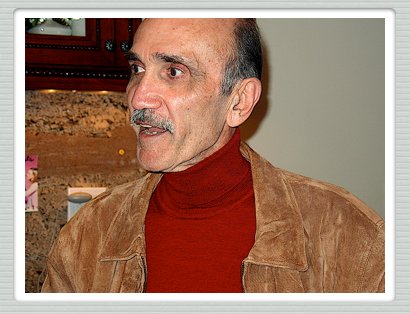 FC:
Well, I don’t know. I just know that particularly young musicians have
to keep moving. You tend to travel a lot from city to city in order
to make a living. Until you really latch on to some organization like
a university or something, you’re pretty much fluid as far as where you’re
going to stay.
FC:
Well, I don’t know. I just know that particularly young musicians have
to keep moving. You tend to travel a lot from city to city in order
to make a living. Until you really latch on to some organization like
a university or something, you’re pretty much fluid as far as where you’re
going to stay.
BD: Is that a good
life, or is it just too demanding?
FC: I suppose it
depends on your own personality. It’s demanding, and if it’s
too demanding as a subjective type thing, all I can say is that it is hard
on you, and the older you get the less attractive it becomes.
BD: I would think
you’d want to settle down eventually.
FC: Oh yes, absolutely.
I’m still looking around for some quiet place on Earth that I could just
write music and breathe in good air.
BD: Try Alaska!
FC: Try Alaska?
[Laughs] I could exploit Alaska next. That’s coming! I
scoped out Oregon, and it’s beautiful, really fantastically beautiful, but
the same thing is going on there. They’re trying to cut down all the
forests for the timber.
BD: You’ve got
to stay two jumps ahead.
FC: Yes!
[Both laugh]
BD: Since we’re
talking about this, has this need to be peripatetic changed appreciably in
the last ten, twenty, thirty, forty years?
FC: I don’t think
so.
BD: So it’s always
been like this and it ever will be?
FC: Well, to say
it always will be, that’s something else again. But certainly artists
have to go where there’s work, and if you’re a composer or a musician from
a small town, if you want to work you’ve got to get to a big town.
That pretty much means usually New York, LA, and possibly Chicago. Something
like that sort.
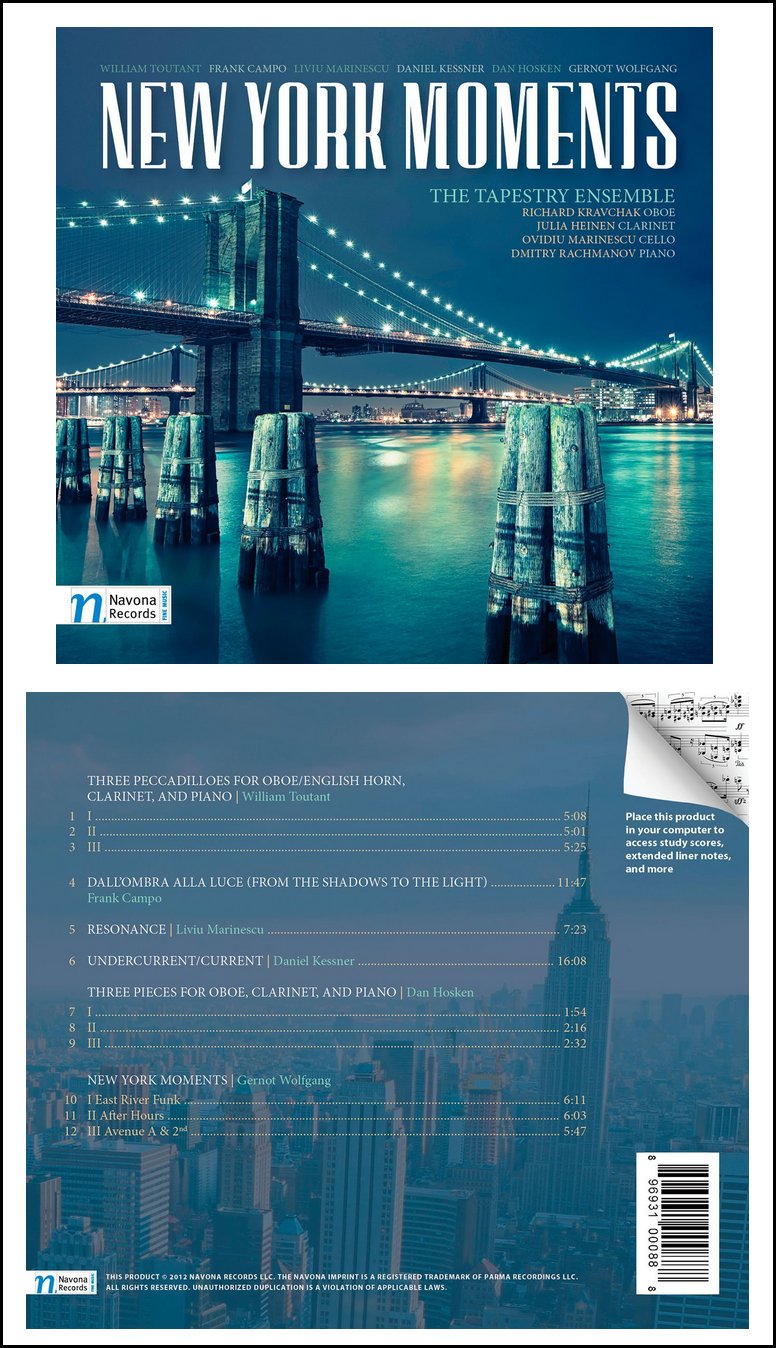
BD: Does that leave
the little towns bereft of musicians?
FC: Yeah, it’s
pretty tough to go out to the Midwest and try to put together a first class
group unless you have the financial backing and can attract musicians.
Cities like St. Paul attracted first class musicians as they have the money
that pay them and to build the auditorium. But that requires money.
It can be done, it’s just tougher, that’s all. Whereas in a city like
LA here, there are just musicians all over the place.
BD: Then do you
have the opposite problem with too many musicians?
FC: The problem
here in LA actually is an insidious one, it’s the studio problem. My
son is a violinist. What happens is musicians long to play so-called
‘good music’, and they want to
get involved in chamber music and then performances of new works. But
these things take a lot of time and a lot of effort, and meantime they keep
getting these calls where you just show up and in two and a half hours you
earn such a huge amount of money. It’s just ridiculous. You can’t
turn it down.
BD: And then your
morning is shot or your afternoon is shot.
FC: Yes, and sometimes
both! You do double sessions, and it’s an ongoing thing. If you
want to form a string quartet or woodwind quintet or something like that
and really do a first class job and spend a lot of time rehearsing and do
some traveling, it’s awfully difficult, awfully difficult.
* *
* * *
BD: In your own
career you are both a teacher and a composer. How do you balance those
two very demanding activities?
FC: First of all
I was a composer long before I was a teacher and I also had to perform before
I was a teacher. I was just determined that when I started teaching
I would keep them both separately distinct, and that the two of them complement
one another in a sense. But I’ve always left time for composition.
I was thinking that if I didn’t leave time for composition, then there was
no point in the kind of work I was doing in teaching. So I’ve always
set aside time for composing.
BD: Do you get
enough time to compose?
FC: Time-wise,
yes. Sometimes I resent that my energies are pulled elsewhere, particularly
when you get well into the semester and these extra activities that are taking
place. Then it isn’t a question of time so much as a question of the
drain on your own resources. You just find yourself thinking of so
many things that the concentrated effort that’s necessary for composing may
not be there. So that’s really the main problem.
BD: Are you teaching
composition or theory, or both or what?
FC: I’m head of
a composition department, and I teach. I have a composition class every
semester, and I teach orchestration, and I have a course which I enjoy very
much which is called Twentieth Century Technique. I’ve just introduced
students to some major techniques of the twentieth century.
BD: Get them not
to be afraid of multi-phonics?
FC: Yes, precisely!
It’s a great fun class to teach because they’re all music majors, but many
of them have never really been exposed in any systematic way to twentieth
century music, so what they’ve heard they didn’t care for or they didn’t
like and didn’t make any sense. Then when they have the time to sit
down and approach it in this manner, they find out that not only they understand
it but very often end up really enjoying it very much.
BD: Is there any
way to do what you’re doing in the class with the general audience to prepare
them more for new pieces?
FC: It’s a good
idea. I don’t know, but not the way this particular class is handled
because this is intended for musicians. But I suppose, sure, absolutely.
There are music appreciation-type courses, and if you have a good instructor
who knew something about twentieth century music and was willing to devote
his energies to it, then I think it would work very well. But the problem,
of course, is that the easiest thing to do with those music appreciation
courses, if they’re dealing with the hard music, is to start with Romantic
Music and then do Impressionism, and maybe throw in a few works of Beethoven
and Mozart. It’s safe, whereas the twentieth century is not always
very safe, and it gets a lot of young people very upset.
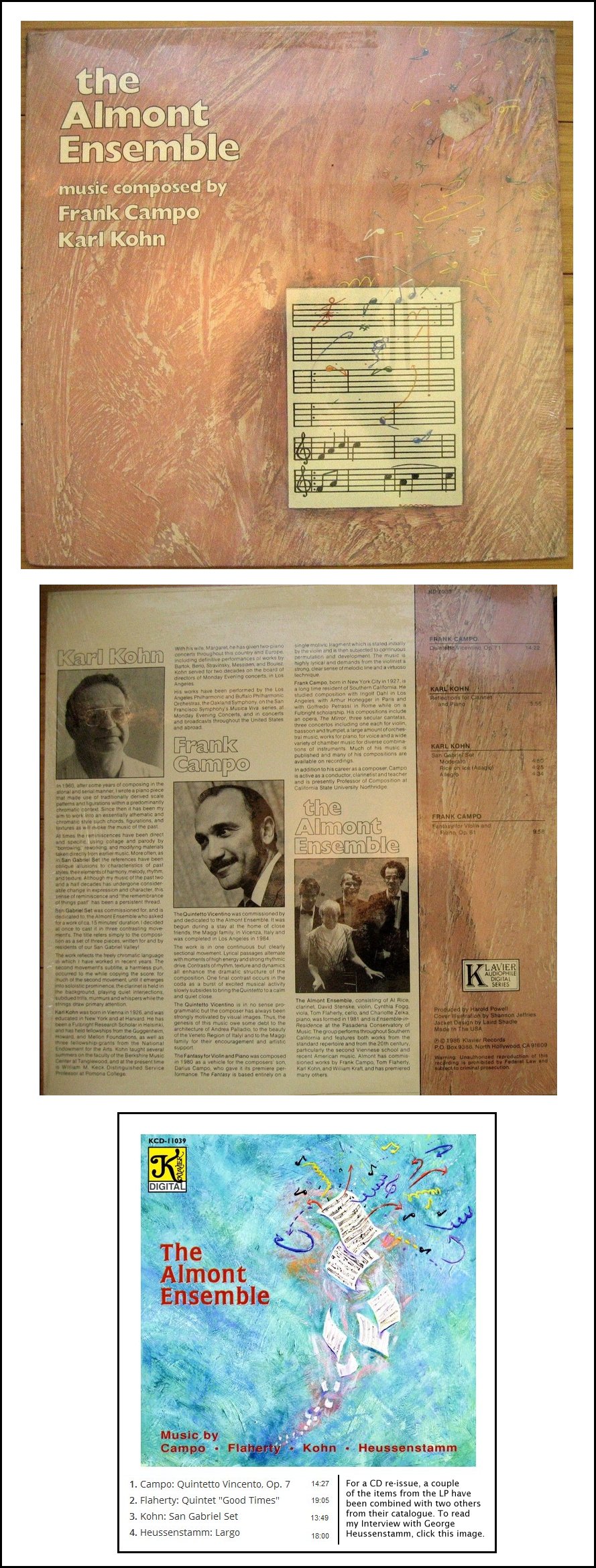
BD: Why did the
twentieth century stop being safe?
FC: [Laughs]
That’s a good question! I don’t know why
the twentieth century stopped being safe.
BD: You’re playing
both sides of the fence — you’re teaching it and you’re
also contributing to it!
FC: Yes, and making
the world unsafe for listeners I suppose.
BD: I assume you
don’t feel the music you compose is unsafe?
FC: Oh, absolutely
not. I think my music is and always has been approachable and understandable
if the listener would give it half a chance.
BD: Do you write
it to be approachable, or do you just write it the way it has to be written?
FC: I write the
way it has to be written, but since I’ve written so much music over the course
of so many years, I’d be able to sit back and get a little perspective on
my own music. I recognize the fact that music which can be understood
and dealt with will be appreciated and enjoyed. There are some composers
who don’t write music that would fall into that category, and their music
somehow or other never seems to be able to reach any kind of wide audience.
BD: Can I assume
you would rather have one of your pieces played on a mixed program rather
than a straight twentieth century program?
FC: Yes, always,
absolutely. This is not to say that I always object to the sort of ghettoization
of twentieth century music. There is enormous number of concerts devoted
exclusively to new music. The problem is you get a drained-down audience.
The audience comes with a certain expectation and you try to satisfy those
expectations. They really aren’t introduced to anything new because
they’ve been to dozens of concerts of this nature before, whereas when you
mix the music, it’s a little of this and a little of that and you get a different
type of audience. I think you get a fresher reaction to it, so yes,
I’d rather be on programs of mixed music. I think it’s healthier.
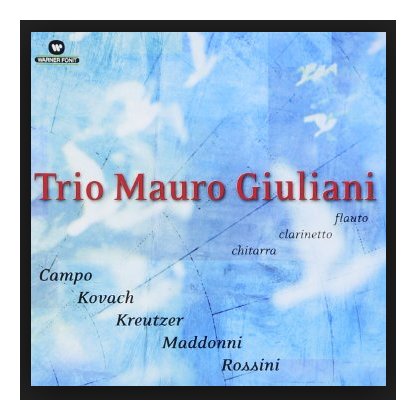 BD: Are you basically pleased with the performances
you’ve heard of your works over the years?
BD: Are you basically pleased with the performances
you’ve heard of your works over the years?
FC: That would
range from being very, very pleased to horribly disappointed.
BD: I hope more
of the former than the latter!
FC: That just depends.
There are two kinds of performances. One is the kind where you have
technical perfection, a kind of cold approach to the performance with the
right notes, dynamics and rhythms all correctly handled, but there’s no real
spark of understanding or warmth or sympathy or empathy for the music.
That really does composers not much good.
BD: Is that really
like saying they have gotten all the way to the starting point?
FC: That’s exactly
what it is, yes, and in many cases they don’t want to get any further.
Another problem occurs with orchestral performances where they do your work
as a living, twentieth century composer, and on the same program there’s a
major work by a standard composer. What happens in most cases is they
spend most of the rehearsal time on the standard work because the conductor
and the orchestra are going to be judged on the performance of that work.
The audience by and large doesn’t know what your work sounds like, so they’ll
be criticized if it comes off sounding poorly.
BD: So they’ll
blame the composer rather than the performer?
FC: Precisely!
They will say it’s a dull work, nothing happened, and you’re dying a thousand
deaths knowing that this went wrong and that went wrong, and they never really
brought the piece to life, and you’ve heard other performances of it where
these things worked so marvelously well. If they had done that with
a standard work, the critics in the audience would recognize this immediately
and would comment on that. But that is one of the age-old problems
of new music, the single performance syndrome. The LA Philharmonic
years ago started a series of concerts called ‘Second Performances’.
There were so many new works that were receiving one performance and that
was the end of it, so they thought they’d give some works a second go-round.
The concept didn’t get very far, sorry to say. But it was a good idea.
BD: Is there any
chance that there are too many men and women writing concert music these
days?
FC: I don’t think
so! The more people that write, the higher the eventual quality is.
It’s a field that is attracting a lot of people, many with enormous talents,
some with best talents, but that’s what makes for wonderful music.
BD: Why should
someone go into the field of composing for the concert audience?
FC: Well, of course
you obviously have to be slightly insane. You have to be rather impractical
by nature and hopelessly romantic. There are too many illogical reasons
for doing it.
BD: Somehow I assumed
that talent for composition would be first.
FC: Yes, but the
point is you’ve got to recognize the fact that you have the ability, and nothing
on earth is going to satisfy you except doing this thing. Assuming
that there’s some streak of rationality inside of you, you recognize the
fact that it’s not going to be the same as making a success as an athlete
or as a rock singer. If they make it to the top, they’ll make huge
piles of money. Remember Stravinsky himself never made a lot of money
as a composer. I was talking to somebody the other day about Stravinsky,
and how here in LA he used to complain because he made no money on
his guest appearances as a conductor. He certainly was no great shakes
as a conductor. He deluded himself that he was, but that’s where the
money was. You just can’t make any kind of marvelous living as a composer
without writing commercial music.
BD: Despite this,
are you optimistic about the future of concert music?
FC: Yes, I think
I am! There’s an audience for it. You just have to seek your
audience and hopefully find the audience. As I go to more and more
concerts over the years, I just see new people constantly showing up, new
audiences constantly being developed, and yes, I’m optimistic about it.
I’m not optimistic that it’ll ever be a lucrative kind of profession, but
that’s a separate issue.
BD: Of course!
[Laughs] The economics of many things baffle people!
FC: No question
about it! [Laughs]
* *
* * *
BD: Coming back
to your compositions and your compositional technique, when you’re sitting
at the desk and you’re faced with a lot of blank staves, you start putting
notes and blobs and marks on the paper. Are you always in control of
that pencil, or are there times when you feel that that pencil is somewhat
controlling your hand?
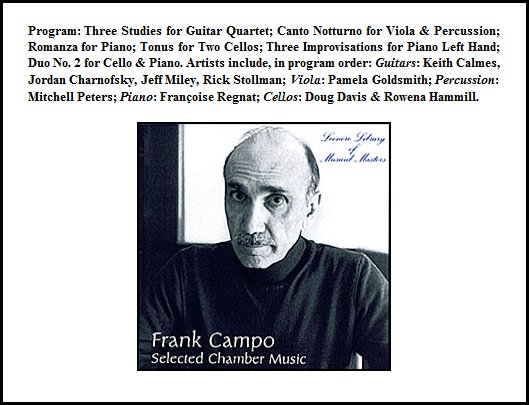 FC: The way I work is something usually occurs in
my head, and I let it just stay there as I wander around the house.
My son used to make fun of me and run around the house. Then I’ll just
sit down and start writing. Am I in control? I don’t know.
That’s so difficult to say. I know what I want to do, and sometimes
when I first put something down I’m very enthusiastic about it, and when
I go back to it the next day and look at it in the cold light of the next
morning, it may be terribly disappointing. But that’s all right because
the hardest thing in music is getting started. It really is. It’s
frightening! The idea of just having nothing is overwhelming.
So I find the best thing for me to do is put something down. Then I
can always work with it and develop it, and if the worst comes to the worst,
I can always throw it away.
FC: The way I work is something usually occurs in
my head, and I let it just stay there as I wander around the house.
My son used to make fun of me and run around the house. Then I’ll just
sit down and start writing. Am I in control? I don’t know.
That’s so difficult to say. I know what I want to do, and sometimes
when I first put something down I’m very enthusiastic about it, and when
I go back to it the next day and look at it in the cold light of the next
morning, it may be terribly disappointing. But that’s all right because
the hardest thing in music is getting started. It really is. It’s
frightening! The idea of just having nothing is overwhelming.
So I find the best thing for me to do is put something down. Then I
can always work with it and develop it, and if the worst comes to the worst,
I can always throw it away.
BD: Do you save
the old ideas that don’t work in one piece and maybe use them in another?
FC: No, I don’t
do things like that! I know lots of people who do it, but it’s not
the way I work, no.
BD: No sketchbooks?
FC: No, no, no.
I have a wastebasket which fills up very quickly, and I just empty it and
fill up another wastebasket! As I get older I tend to depend less on
pre-ordained systems and more and more on my inner-self. Whether that’s
because I have just done so many things in the past and don’t have to depend
on any type of system, or whether that was my natural way is difficult to
say. But I know that’s the way I work.
BD: When you’re
working and working and you get the piece ready, and all of the marks are
on the page, you go back and tinker with it. How do you know when to
put the pencil down and say it is ready?
FC: That just happens
to you. You keep looking and working the piece to death, and reworking
and changing it, and finally you come to the place where you realize that
this is it! It’s a strange moment because you’re torn in two directions.
In one sense there’s a feeling of elation. You’ve finished something
and that’s always a wonderful feeling. On the other hand, it’s a bit
of a letdown because every artist always expects that the next work is going
to be the one that is absolutely perfect... and nothing ever is perfect.
BD: Is there any
way of achieving musical perfection?
FC: No, nor any
other kind of perfection. If you ever achieved any kind of perfection,
you’d have to quit right then and there because by definition you can’t surpass
that. So if you were to write a symphony that was absolutely perfect
in every way, shape and form, there would be no point writing another symphony.
What every artist is always trying to do is go beyond what he or she did
the last time round, or did at any time in the past. That’s what makes
being an artist so much fun because you’re never going to totally succeed.
BD: So each time
you succeed in different places?
FC: Yes.
It’s a question of succeeding to a degree, but never to the ultimate degree.
BD: How much leeway
do you expect on the part of the performer for interpretation?
FC: Everything
that I want is there, and the players really have to play it as it’s written.
But understanding is part of what performing is all about.
BD: I assume you
would not want each performance to be a carbon copy?
FC: No, definitely
not. That’s the fun of live performance. You can hear something
five or six more times, and each time it’s slightly different, and each time
it could be really quite successfully performed. Interpretation is
part of it, but again you’re talking about questions of degrees. It’s
like playing a Brahms symphony or something. Each time you can do it
slightly differently and it might work each time. What contemporary
composers need are performers who are highly intelligent and have the techniques
that go beyond what the composer of the past required. That’s hard
to find! Good players don’t really have to play new music when you
come right down to it. They can still make a living playing Brahms
and Beethoven. Certainly in the larger cities of the United States
and Europe, there are groups of dedicated musicians who have this wonderful
technique and are willing to devote extra time and effort to learning new
music. Actually, it takes satisfaction from doing this, and it’s the
thing that composers have to have. They’re lost
without it. I’ve always spoken to performers, and I’ve told them if
they don’t believe in the work, don’t perform it because if they play a work
without understanding it and believing it, they’re not doing the composer
any favor at all. They’re doing the composer a disservice in the final
analysis.
BD: And the audience
too?
FC: Yes, though
the audience doesn’t know it. That’s the only thing. The audience just
probably leaves feeling kind of empty and feeling that it wasn’t a very good
piece, or it wasn’t a very exciting evening. But, yes, you’re surely
letting the audience down, too.
* *
* * *
BD: You talk about
the performances being different each time, so we can come to the other side
of the coin, which is the recordings, which are exactly the same every time
you plop the needle down. [Remember,
this conversation took place in 1991, when CDs were still relatively new
to the scene and LPs were still a major format.]
FC: Right.
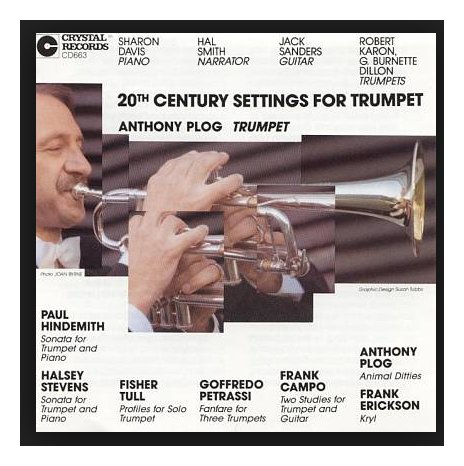 BD: You’ve got a number of recordings of your music.
Are you basically pleased with those recordings, because they have more circulation
than a single performance?
BD: You’ve got a number of recordings of your music.
Are you basically pleased with those recordings, because they have more circulation
than a single performance?
FC: That’s the
advantage of a recording, and there’s a perfection on a recording that is
admirable, whereas at the live performance anything can and often does go
wrong. But records obviously have a tremendous influence in aiding
a composer’s music to be circulated to a large degree. There’s no question
about that. On the other hand, I certainly am a firm believer in live
performance. But as far as my own recordings, I’ve been fortunate enough
to have a lot of recordings of my works, and by and large they’ve all been
excellent. But on the other hand, it was the players who wanted to
record the works in the first place, so the players believed in the work
before the idea of recording them came up. So that’s an advantage.
I don’t think that a player’s been called in to perform a work of mine at
the last minute and wasn’t interested in the work specifically. So
I’ve been fortunate in that respect.
BD: Most of the
recordings are of different kinds of chamber groups. Do you enjoy writing
for different kinds of chamber groups as opposed to, say, orchestra or a
band?
FC: I love writing
for chamber music, but I love writing for orchestra, too. It’s only
that performances of chamber music can be so much more successful because
you can find a quartet or a quintet of players that are absolutely totally
dedicated to what they’re doing. Whereas very often with large orchestras
there’s are groups within the orchestra and fractions within the orchestra
which just put up a barrier every time they have to play a new work.
You have to face that. I’ve been backstage with the musicians in various
cities when they’ve played brand new works of world famous composers, and
I’ve been shocked by some of the reactions from some of the performers who
deeply resented playing some of the music.
BD: They’d rather
be playing another Haydn symphony or another Beethoven?
FC: Sure, absolutely!
With chamber music that happens less. The players really have to be
dedicated to what they’re doing and believe in what they’re doing.
Usually in a quartet or a quintet, everybody has discussed what they’re going
to play anyway. They discuss the repertoire, and will play this and
not do that because they don’t believe in that particular work.
BD: Hopefully with
a quartet you’ve gotten four yes votes!
FC: That’s basically
what happens! With an orchestra, you have to some committee and a conductor,
and they’re all pretty far removed from the players themselves.
BD: So then your
recordings, while good, only really reflect one side of your compositional
output?
FC: Oh, sure!
Absolutely! It’s like the case of The Blind Men and the Elephant.
One feels the tail and says an elephant is shaped like a rope, and another
feels the ear, etc., etc. I sometimes feel that way as a composer.
Some people have the idea that I write only brass music. Others have
the idea that I write only woodwind music, or whatever it happens to be that
they hear! I don’t think any of my vocal music has ever
been recorded, and although there was a plan for an orchestral work to be
recorded, none are on records right at the moment. So that’s always
the problem. There’s always economics.
BD:
Now you mentioned that there might be an orchestral work coming out.
Are there any other recordings which are in the pipeline?
FC: Yes, there
are several, but I don’t know what’s happening. There’s a new work
for soprano sax and guitar which has been recorded but I don’t know what
company will release the recording. I got a phone call telling me that
the recording is just super and they’re very happy with the recording.
Then there are several other pieces that are sitting around on tape waiting
to be released. I don’t know what company will release them, and I
don’t know when they’ll come out, but that’s the way it is with composers.
We’re the last to learn about things like that. I was in somebody’s
house yesterday, visiting an old friend who is an audio engineer, and he
told me that a CD has just been released of an old work of mine, Times for unaccompanied trumpet, the
Tom Stevens recording. [The three movements are Good Times, Hard Times, and Time to Go] I didn’t
even realize there was a CD out on it. [Laughs] He was kind enough
to give me a copy!
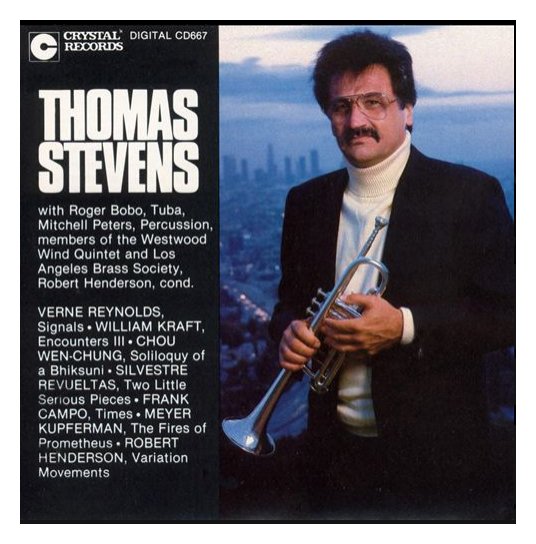
To read my Interview with William Kraft, click HERE.
To read my Interview with Chou Wen-Chung, click HERE.
To read my Interview with Meyer Kupferman, click HERE.
|
BD: Is that a re-issue?
[Looks at his own copies of both the LP and CD]
FC: Yes, of the
old long-playing recording.
BD: Right.
They put a wrong date on it. The CD says 1979, and on the LP record
it says 1971.
FC: It’s 1971!
BD: For a minute
I thought it was two different works.
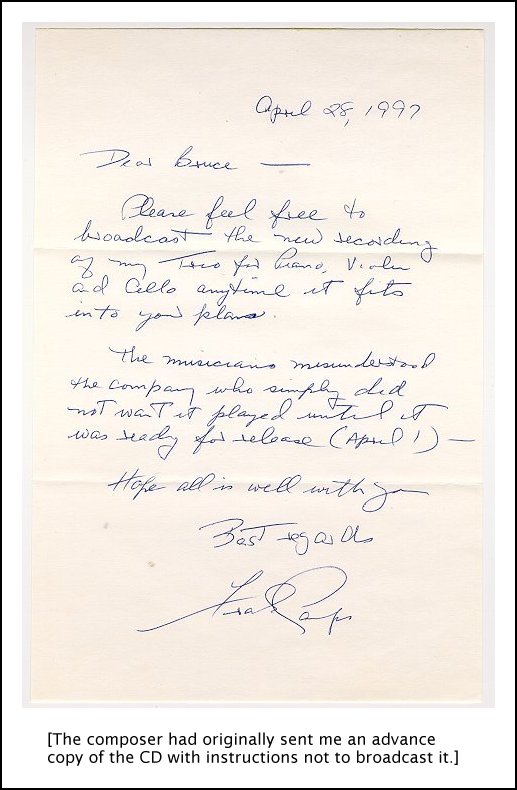 FC: Oh well, as long as the music is well recorded.
I haven’t had the chance to sit down and listen yet. At least it’s an
electrical reworking of the work, if nothing else! Tom’s a wonderful
artist, and it’s one of those strange works I did so many years ago.
Yet it gets played constantly in live performances. It always amazes
me that it should be a work like that, but it is a very popular with trumpet
players.
FC: Oh well, as long as the music is well recorded.
I haven’t had the chance to sit down and listen yet. At least it’s an
electrical reworking of the work, if nothing else! Tom’s a wonderful
artist, and it’s one of those strange works I did so many years ago.
Yet it gets played constantly in live performances. It always amazes
me that it should be a work like that, but it is a very popular with trumpet
players.
BD: You mentioned
vocal music, and I know you’ve written one opera. Tell me the joys
and sorrows of writing for the human voice.
FC: The joy is
just hearing the human voice, which I believe in. It’s a wonderful
instrument, and it’s a highly flexible, highly expressive instrument.
The sorrows are that there aren’t that many singers around that are capable
of first class performances of twentieth-century music, particularly any kind
of new music. So you have problems, and then if you find a good singer
that you can work with, it’s a good idea to stick with that person and keep
writing for them. From time to time I’ve come across wonderful singers,
and things have worked out well between us. But again, it’s the same
thing with singers and maybe even more that I said about orchestras.
So many singers would just as soon sing Italian opera, and would rather not
venture into the field of twentieth century music. There are the same
old two reasons — one, they feel uncomfortable, and
two, it’s difficult. Then I throw in a third reason — they
are afraid that the audiences won’t care for it, whereas if they
get up and sing a Puccini aria, they’ll bring the house down. Sing
a twentieth century work, and even if they do a wonderful job, the reaction
depends on the kind of audience you have there.
BD: I keep coming
back to this, but is there any way of getting the general public to be more
interested in new works?
FC: From my understanding,
what you’re doing is certainly one way of doing it! It’s a question
of exposure, nothing else. If you keep presenting new music, it becomes
a part of your life and you begin to understand it and appreciate it.
If you see contemporary music as simply being in continuation of a long tradition,
you feel comfortable with it. The problem occurred early in this century
where a lot of foolish things were written about what was happening with
art — that it was breaking with tradition and rejecting
the past. Nothing could have been further from the truth. People
like Schoenberg and Stravinsky and Varèse, not to mention the great
painters like Picasso and Kandinsky, and members of each of the arts, were
doing no such thing. They are making a logical continuation of
what had happened before, but it was an expression of their own age.
BD: Should we try
to demonstrate for the general audience the sameness with the past rather
than the difference from the past?
FC: Why not? That’s
a good starting point because it gives an audience something to hold on to.
That’s a great starting point, and as a matter of fact, with my Twentieth
Century Techniques class that is one of the things I like to do
— to show how many ideas that appear to be new are very simply
reworking or even repeating of older concepts. When you first are exposed
to them, they might appear a little forbidding, a little overwhelming, but
when you examine them more carefully, you see that they’re really not.
BD: We’re kind
of dancing around this, so let me ask the question straight out. What
is the purpose of music in society?
FC: Well, one of
the purposes of art in general is to enrich our lives. That’s all I
can say about it, but for all of the arts the purpose is to enrich our lives,
to stimulate our mind to some inner spirit that we all possess. It
is to stimulate some finer inner part of ourselves, but basically it comes
down to enriching our lives.
BD: You’re about
to have a sixty-fifth birthday! Any reflections on trends or surprises,
good or bad, that you didn’t expect in those years?
FC: No, I can’t
say that I have had anything that surprised me so far! [Laughs]
BD: Are you pleased
with where you are at this point?
FC: I’m at ease
with myself! I understand myself, I understand what I’m trying to do,
I enjoy doing it, I feel no sense of discontent. I’m glad I started
out doing what I’ve done all my life because it’s been very rewarding, very
rich, very satisfying, and it’s something I’ll never ever completely succeed
at, and that makes me happy because I like the striving. That’s what
satisfaction is generated from — the striving, the
attempt to create something which is some type of perfection. As I
said before, perfection is elusive, and at no time will everybody else ever
achieve that kind of perfection, but the fun is in trying.
BD: Do you just
work on just one composition at a time, or do you have several going at once?
FC: I work at one
at a time. When I’m working on something, I can’t think of anything
else really. So it doesn’t bother me to go off and teach a class or
run an errand because that’s just a relief. It’s a chance to get away,
and then come back to it and look at the problem with a fresh perspective.
But one piece at a time! I’m not one of these composers who can write
three or four works at a time. I wouldn’t enjoy doing it.
I’m not sure I couldn’t, I just wouldn’t enjoy doing it.
BD: And that’s
the whole point — to enjoy what you’re doing.
FC: Yes, absolutely.
If you’re not enjoying the art of composition, I don’t know what the heck
being an artist is for. There’s really not much else to be involved
in it. You’re doing it for the inner satisfaction that it’s bringing
you.
BD:
It’s been great talking with you. I appreciate your allowing me to
spend some time with you, and getting to know some of your ideas.
FC: Absolutely!
I appreciate your efforts, not only on my behalf but on behalf of contemporary
music, particularly contemporary American music.
BD: Believe me,
it’s a labor
of love at this end!
FC: Marvelous!
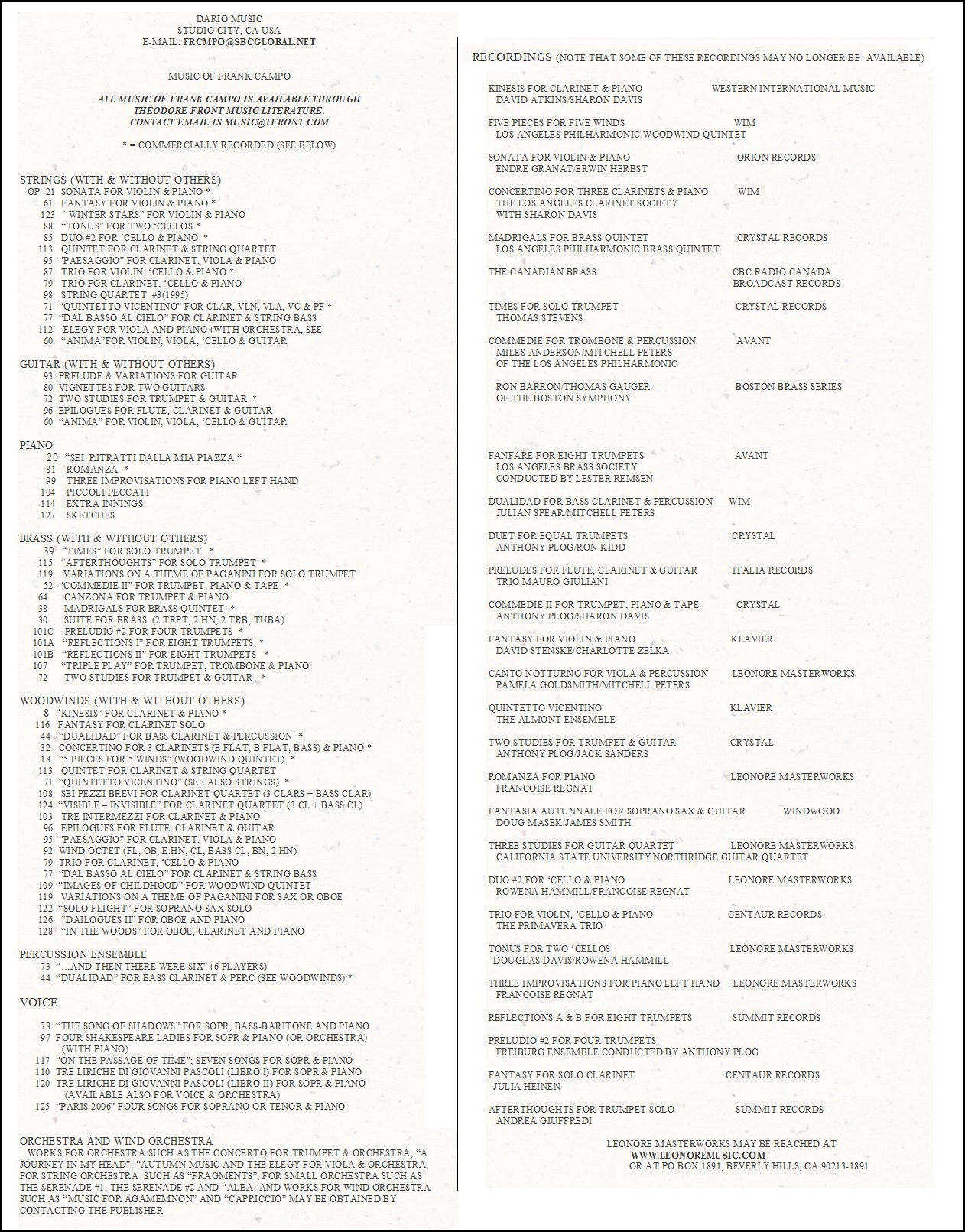
© 1991 Bruce Duffie
This conversation was recorded on the telephone on August 12, 1991.
Portions were broadcast on WNIB the following year, and again in 1997.
This transcription was made in 2015, and posted on this website at that time.
My thanks to British soprano Una Barry for her
help in preparing this website presentation.
To see a full list (with links) of interviews which have been transcribed
and posted on this website,
click here. To
read my thoughts on editing these interviews for print, as well as a few
other interesting observations, click here.
* * * *
*
Award -
winning broadcaster Bruce
Duffie was with WNIB, Classical
97 in Chicago from 1975 until its
final moment as a classical station in February
of 2001. His interviews have also appeared in
various magazines and journals since 1980, and he now
continues his broadcast series on WNUR-FM, as
well as on Contemporary
Classical Internet Radio.
You are invited to visit his website for more information
about his work, including selected transcripts
of other interviews, plus a full list of his
guests. He would also like to call your attention
to the photos and information about his grandfather,
who was a pioneer in the automotive field more than a century ago.
You may also send him E-Mail with comments,
questions and suggestions.
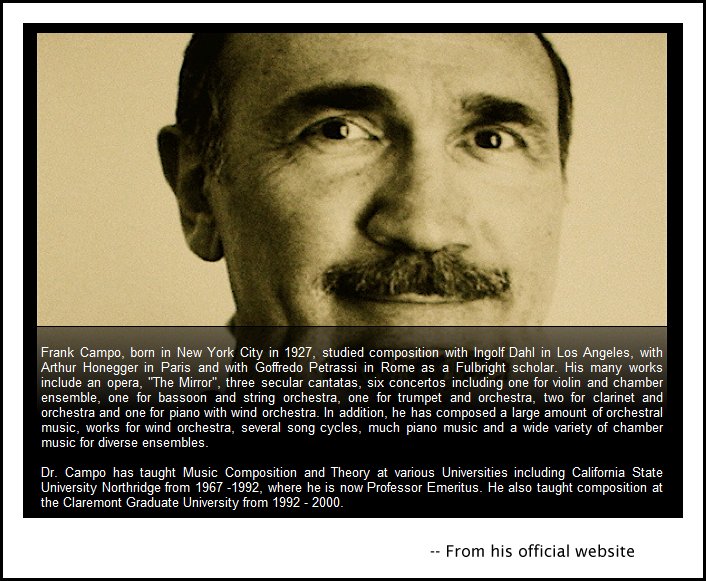

 FC:
Well, I don’t know. I just know that particularly young musicians have
to keep moving. You tend to travel a lot from city to city in order
to make a living. Until you really latch on to some organization like
a university or something, you’re pretty much fluid as far as where you’re
going to stay.
FC:
Well, I don’t know. I just know that particularly young musicians have
to keep moving. You tend to travel a lot from city to city in order
to make a living. Until you really latch on to some organization like
a university or something, you’re pretty much fluid as far as where you’re
going to stay.
 BD: Are you basically pleased with the performances
you’ve heard of your works over the years?
BD: Are you basically pleased with the performances
you’ve heard of your works over the years? FC: The way I work is something usually occurs in
my head, and I let it just stay there as I wander around the house.
My son used to make fun of me and run around the house. Then I’ll just
sit down and start writing. Am I in control? I don’t know.
That’s so difficult to say. I know what I want to do, and sometimes
when I first put something down I’m very enthusiastic about it, and when
I go back to it the next day and look at it in the cold light of the next
morning, it may be terribly disappointing. But that’s all right because
the hardest thing in music is getting started. It really is. It’s
frightening! The idea of just having nothing is overwhelming.
So I find the best thing for me to do is put something down. Then I
can always work with it and develop it, and if the worst comes to the worst,
I can always throw it away.
FC: The way I work is something usually occurs in
my head, and I let it just stay there as I wander around the house.
My son used to make fun of me and run around the house. Then I’ll just
sit down and start writing. Am I in control? I don’t know.
That’s so difficult to say. I know what I want to do, and sometimes
when I first put something down I’m very enthusiastic about it, and when
I go back to it the next day and look at it in the cold light of the next
morning, it may be terribly disappointing. But that’s all right because
the hardest thing in music is getting started. It really is. It’s
frightening! The idea of just having nothing is overwhelming.
So I find the best thing for me to do is put something down. Then I
can always work with it and develop it, and if the worst comes to the worst,
I can always throw it away.  BD: You’ve got a number of recordings of your music.
Are you basically pleased with those recordings, because they have more circulation
than a single performance?
BD: You’ve got a number of recordings of your music.
Are you basically pleased with those recordings, because they have more circulation
than a single performance? FC: Oh well, as long as the music is well recorded.
I haven’t had the chance to sit down and listen yet. At least it’s an
electrical reworking of the work, if nothing else! Tom’s a wonderful
artist, and it’s one of those strange works I did so many years ago.
Yet it gets played constantly in live performances. It always amazes
me that it should be a work like that, but it is a very popular with trumpet
players.
FC: Oh well, as long as the music is well recorded.
I haven’t had the chance to sit down and listen yet. At least it’s an
electrical reworking of the work, if nothing else! Tom’s a wonderful
artist, and it’s one of those strange works I did so many years ago.
Yet it gets played constantly in live performances. It always amazes
me that it should be a work like that, but it is a very popular with trumpet
players.